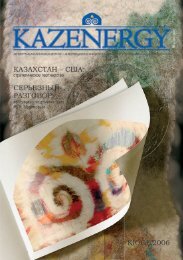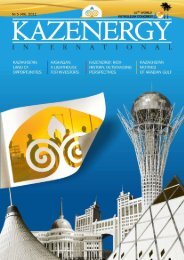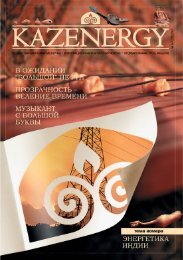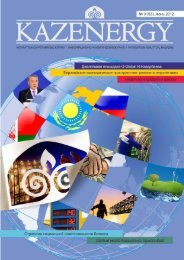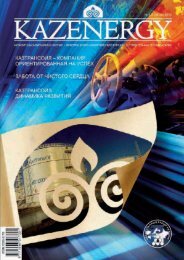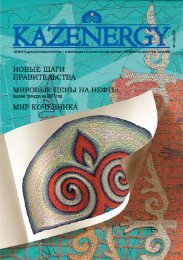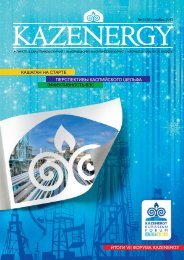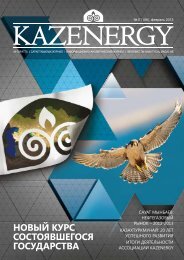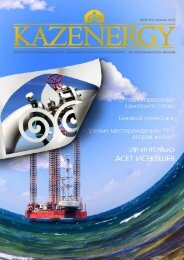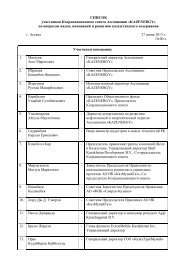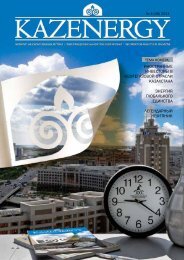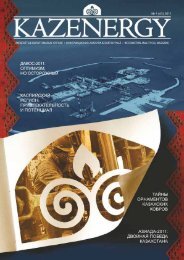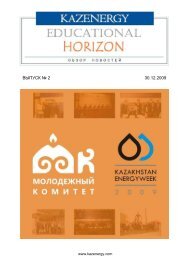KAZAKHSTAN UPSTREAM OIL AND GAS technology and R&d ...
KAZAKHSTAN UPSTREAM OIL AND GAS technology and R&d ...
KAZAKHSTAN UPSTREAM OIL AND GAS technology and R&d ...
Create successful ePaper yourself
Turn your PDF publications into a flip-book with our unique Google optimized e-Paper software.
4.2 Field management: optimised recovery including IOR/EOR<br />
Challenge commentary<br />
Maximising the production <strong>and</strong> ultimate<br />
recovery of oil <strong>and</strong> gas from existing assets is<br />
a constant challenge for operators all around<br />
the world. The conditions in Kazakhstan<br />
– unusually complex reservoirs, high<br />
temperatures <strong>and</strong> pressures, high H 2<br />
S levels<br />
<strong>and</strong> arctic weather conditions – all combine<br />
to pose particularly difficult field management<br />
problems for even the leading operators.<br />
Waterflooding for improved oil recovery (IOR)<br />
is used extensively in Kazakhstan. However,<br />
matching the properties of the injection stream<br />
with those of the hydrocarbons present in the<br />
reservoir <strong>and</strong> the characteristics of the rock<br />
matrix is not easy. Consequently, benefits<br />
are often limited <strong>and</strong> field performance may<br />
even decline as a result of this treatment.<br />
Selecting the best enhanced oil recovery<br />
(EOR) technique, or combination of IOR <strong>and</strong><br />
EOR, is even more fraught <strong>and</strong> the economics<br />
even more likely to prove unsatisfactory. The<br />
challenge is to better underst<strong>and</strong> (via data<br />
capture, analysis <strong>and</strong> modelling) the reservoirs<br />
<strong>and</strong> be able to predict more accurately what<br />
will happen when water, chemicals, gas or heat<br />
are used to enhance hydrocarbon recovery.<br />
EOR is known to be largely ineffective in<br />
tight reservoirs, which require stimulation by,<br />
for example, fracturing, acid treatment or<br />
re-perforation. The challenge here surrounds<br />
the modelling, selection, application <strong>and</strong><br />
monitoring of the chosen stimulation technique<br />
in tight carbonate reservoirs with few natural<br />
fractures, such as the Korolev field.<br />
A third challenge is specifically related to the<br />
underst<strong>and</strong>ing <strong>and</strong> management of coning<br />
<strong>and</strong> water <strong>and</strong> gas breakthrough under<br />
different depletion profiles, vital to achieving<br />
high recovery factors with fewer wells.<br />
Problems are particularly acute during the final<br />
stages of production, when formation pressure<br />
<strong>and</strong> flow rates fall <strong>and</strong> water influx increases.<br />
Karashaganak, Kenkiyak, Zhanazhol <strong>and</strong><br />
Alibekmola fields have all experienced<br />
problems along these lines.<br />
VALUE<br />
CHALLENGE (elements)<br />
EOR techniques<br />
Improved well productivity<br />
from tight reservoirs<br />
4.2.6<br />
4.2.7<br />
4.2.8<br />
4.2.10<br />
4.2.1<br />
4.2.5<br />
4.2.9<br />
4.2.2<br />
4.2.3<br />
4.2.4<br />
4.2.11<br />
TECHNOLOGY SOLUTIONS<br />
4.2.2 Advanced waterflooding & EOR<br />
4.2.3 EOR gas injection<br />
4.2.4 EOR modelling<br />
4.2.11 Optimised field management<br />
4.2.1 Well stimulation<br />
4.2.5 Water based fracture fluid systems<br />
4.2.6 Fracture monitoring & control<br />
ATTRACTIVENESS<br />
4.2.7 ‘In-well monitoring’ for observing reservoir dynamics<br />
4.2.8 ‘In-well monitoring’ using wireline tools<br />
(for integrity & water content)<br />
4.2.9 Reservoir monitoring with geo-chemistry & tracers<br />
4.2.10 Well (in)flow control<br />
89<br />
Management of coning,<br />
water & gas breakthrough<br />
Kazakhstan Upstream oil & gas <strong>technology</strong> <strong>and</strong> R&D roadmap




